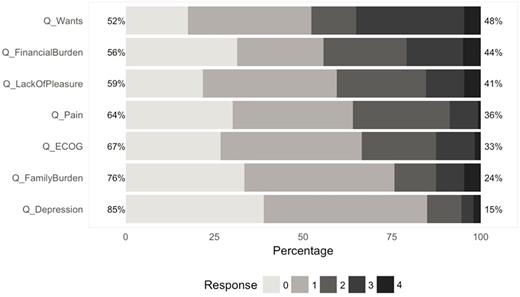Abstract
Background: Advances in the management of multiple myeloma (MM) have significantly extended survival and dramatically reduced painful skeletal-related events for most patients. As MM is evolving to a chronic disease increased attention towards symptom and psychological impact is required. We sought to determine the incidence of self-reported pain, depression, financial and family burden, and impairment of performance status in a cohort of patients with MM receiving outpatient therapy at a tertiary cancer center and to determine the correlation of total distress with survival. Methods: The Living with Cancer (LWC) patient reported outcome (PRO) instrument is a statistically validated tool (ASCO Palliative Care Symposium 2016) that evaluates distress from the point of view of the advanced cancer patient. The 7-item 5-level Likert survey measures 4 personhood domains (performance status, pain, burden [financial and family], depression). The questions are also weighted by the patient with regards to importance, yielding a total score range 0-112. In a pilot study of advanced cancer patients a score of >28 was associated with an increased likelihood of physicians' (blinded) opinion regarding need for end-of-life care discussions (J Palliative Med 2016). For individual survey items, a self-reported rating of 2-4 was considered to indicate patient concern. Results: 239 patients with MM completed the LWC PRO between Sept 2015 and Oct 2016. Patients were 57% male with a median age 67 years. 48% of patients were concerned that they could not do the things they wanted to do, with 33% reporting decreased performance status. Financial toxicity concerns were self-reported by 44%, with family burdens noted in 24%. Although depression was reported by only 15%, 41% reported lack of pleasure. Pain was self-reported as a concern by 36%. With a median follow up of 316 days since LWC completion, 13% of patients had died. A high total distress score (>28) was noted in 57 (24%) and associated with a decreased survival rate compared to the 182 (76%) patients with a low total distress score (p<0.05). The 6 month survival rates from the completion of the LWC survey for patients with high/low distress scores were 86% and 96% respectively, and 12 month survival rates were 76% and 87% respectively. Conclusions: Despite dramatic improvements in survival among patients with MM, symptom, financial, and psychosocial concerns continue to plague patients. As a chronic disease, additional attention to addressing these issues is required.
Richter: BMS: Speakers Bureau; Janssen: Speakers Bureau; Amgen: Membership on an entity's Board of Directors or advisory committees, Speakers Bureau; Takeda: Membership on an entity's Board of Directors or advisory committees, Speakers Bureau; Celgene: Membership on an entity's Board of Directors or advisory committees, Speakers Bureau. Biran: Celgene, Amgen: Consultancy, Speakers Bureau; Takeda: Speakers Bureau. Paramanathan: COTA: Employment. Arunajadai: COTA: Employment. DeVincenzo: COTA: Employment. Pe Benito: COTA: Employment. Gruman: COTA: Employment. Kaur: COTA: Employment. Hervey: COTA: Employment, Equity Ownership, Membership on an entity's Board of Directors or advisory committees. Schultz: COTA: Employment, Equity Ownership, Membership on an entity's Board of Directors or advisory committees. Paddock: COTA: Employment, Equity Ownership. Pecora: Caladrius Biosciences: Equity Ownership, Membership on an entity's Board of Directors or advisory committees; COTA: Equity Ownership, Membership on an entity's Board of Directors or advisory committees, Patents & Royalties. Siegel: Celgene, Takeda, Amgen Inc, Novartis and BMS: Consultancy, Speakers Bureau; Merck: Consultancy. Goldberg: Ariad: Speakers Bureau; Pfizer: Honoraria; COTA: Employment, Equity Ownership; Novartis: Honoraria, Research Funding, Speakers Bureau; Bristol Myers Squibb: Research Funding, Speakers Bureau; Jazz: Speakers Bureau; Celgene: Speakers Bureau.
Author notes
Asterisk with author names denotes non-ASH members.


This feature is available to Subscribers Only
Sign In or Create an Account Close Modal